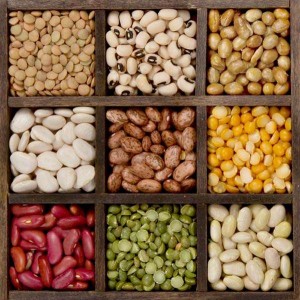Bountiful Beans: The Secret to Good Health
 Beans may not seem very exciting, but when you learn a little more about what they can do for your health, you will end up with a new-found respect for these surprisingly healthy legumes.
Beans may not seem very exciting, but when you learn a little more about what they can do for your health, you will end up with a new-found respect for these surprisingly healthy legumes.
Which “beans” do we mean?
The beans, in this case, are not your everyday green beans or wax beans. Also known as “legumes,” the beans we’re focusing on include kidney beans, black beans, pinto beans, cannellini beans, soybeans, chick peas (garbanzo beans), lentils and dried peas.
If you’re a history buff, you might be interested to know that beans date back to ancient times, at least 20,000 years ago. Evidence shows that they were part of both Egyptian and Greek cultures. They’re even mentioned in the Old Testament of the Bible!
How beans can help your health
- Heart health: Beans are naturally high in soluble fiber, a type of fiber that can help lower blood cholesterol levels. Beans are also low in sodium, which is helpful if you have high blood pressure (rinse canned beans well before eating to lower the salt content). In addition, beans are high in potassium, folate and antioxidants, which can help lower your risk for heart disease.
- Diabetes: If you or someone you know is at risk for getting type 2 diabetes, make a point to include beans in your eating plan. Beans may lower blood glucose and insulin levels, which can stave off diabetes. And if you have diabetes, beans can help lower the blood glucose “spike” that people often have a few hours after eating.
- Weight: There’s no magic pill for weight loss, but beans may come pretty close! Besides being high in fiber (which helps fill you up so that you eat less), beans are high in protein. Including more protein in your meal plan can help keep you full, and can also ensure that you keep your lean muscle mass. Also, beans are lower in calories than many other protein foods, such as fatty meats and cheese.
- Cancer: Bean’s fiber, vitamin and antioxidant content makes them an important part of cancer prevention, especially cancers of the colon, breast and pancreas.
Making beans a part of your diet
If you’re not used to eating, say, black beans, chick peas or lentils, you might be scratching your head wondering how to cook them. Fortunately, there are thousands of recipes out there that can keep you in beans for a long time (do an internet search for “healthy bean recipes”). In the meantime, easy ways to fit beans into your diet include:
- Adding beans to salads
- Whipping up a batch of black bean or minestrone soup
- Serving beans as a side dish, in place of rice or potatoes
- Throwing beans into your favorite pasta recipe
- Snacking on carrot, celery or cucumber sticks dipped in hummus
- Substituting beans (kidney or pinto beans) for some or all of the ground beef in your next pot of chili
- Serve edamame (green soybeans) in their pods as a tasty appetizer
Parting words
Beans are also known for making you feel somewhat bloated and gassy. This is normal, but the more often you eat beans, the less uncomfortable you’ll be. Start out slowly when you eat beans or any high fiber food to help lessen those side effects. Soaking dried beans overnight in water and lemon juice before you cook them can also help with this.
—
Editor’s Note: Caution is advised for people who have dietary restrictions in regards potassium, as beans usually contain a high percentage of the nutrient. Please consult with a dietitian for advice before modifying your diet based on this article.

